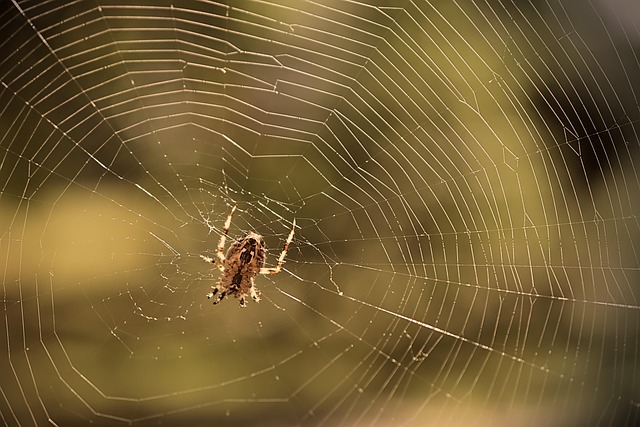Effective spider infestation prevention combines eco-conscious practices with understanding spider behavior. Key strategies include sealing entry points, maintaining cleanliness and lighting, removing webbing and insects, using natural repellents like citrus oils or lavender, planting aromatic herbs, and regularly vacuuming. These humane methods create an unwelcoming environment for spiders while preserving ecological balance. By adopting these safe practices, individuals can achieve a spider-free living space without resorting to toxic chemicals.
Spiders can be a nuisance, but preventing and managing infestations without harming them or the environment is crucial. This article explores humane and eco-conscious approaches to spider prevention, offering insights into understanding spider behavior, employing eco-friendly solutions, creating physical barriers, and adopting safe practices for removal. By implementing these strategies, you can effectively control spider infestations while minimizing ecological impact. Discover how to make your space less appealing to spiders without resorting to harsh chemicals.
Understanding Spider Behavior: Key to Effective Prevention
Understanding spider behavior is a crucial step in implementing effective spider infestation prevention methods that are both humane and eco-conscious. Spiders play a vital role in maintaining ecological balance by keeping insect populations in check. However, their presence indoors can cause distress for many people. To prevent spiders from entering homes or buildings, it’s essential to know their habits and preferences.
Spiders are attracted to dark, quiet spaces with plenty of hiding spots and close proximity to food sources. They navigate using chemical cues (pheromones) and visual signals. By eliminating potential entry points, sealing cracks and gaps, and keeping areas clean and well-lit, you can deter spiders from seeking shelter in your space. Regular vacuuming and sweeping help remove webbing and trapped insects that might attract spiders. Additionally, using natural repellents like citrus oils or lavender can provide a humane alternative to chemical insecticides, further minimizing ecological impact while maintaining a spider-free environment.
Eco-Friendly Solutions for Spider Infestation Control
When dealing with spider infestations, it’s crucial to adopt eco-friendly solutions that avoid harmful chemicals and promote a balanced ecosystem. Natural repellents like essential oils—citronella, peppermint, and tea tree oil—can effectively deter spiders due to their strong scents. Planting herbs like lavender, rosemary, and lemongrass around the perimeter of your home can also serve as a natural barrier.
Additionally, maintaining a clean and clutter-free environment is key in spider infestation prevention. Regularly vacuuming and cleaning hard-to-reach areas deny spiders hiding spots and food sources. Sealing entry points like cracks and gaps in walls or windows helps prevent their entry. These humane and eco-conscious approaches ensure a safe living space without resorting to toxic chemicals, fostering a harmonious relationship with nature.
Creating an Unwelcoming Environment for Spiders
Creating an unwelcoming environment for spiders is a key strategy in spider infestation prevention. This involves eliminating potential hiding spots and food sources, as spiders are attracted to dark, secluded areas where they can build webs and lie in wait for prey. Regularly cleaning and decluttering your space, especially corners and crevices, makes it less inviting for spiders. Using natural repellents like citrus oils or lavender can also help deter them without resorting to harmful chemicals.
Additionally, sealing entry points such as gaps around windows, doors, and pipes prevents spiders from easily entering your home. Maintaining a tidy garden by removing dead plants, cutting back vegetation, and securing outdoor trash cans will further reduce the likelihood of a spider infestation. By making these adjustments, you create a less hospitable environment for spiders, ensuring a more comfortable living space for both you and your family while promoting ecological balance.
Safe and Humane Practices for Spider Removal
When dealing with spiders, it’s essential to employ safe and humane practices for removal, especially in homes or shared spaces. Instead of resorting to harmful chemicals or aggressive methods, consider using natural deterrents like citrus oils, mint, or spice blends known to repel these arachnids. Regular cleaning and maintaining a clutter-free environment can also significantly reduce spider infestations, as they prefer hidden corners and undisturbed areas.
Humanely trapping and relocating spiders is another effective approach. This method involves setting up sticky traps strategically placed in corners or along walls, allowing spiders to enter but unable to escape. Once captured, spiders can be released outdoors away from human habitats. It’s a kind way to manage spider populations while ensuring their well-being and minimizing environmental impact, key aspects of spider infestation prevention.
In conclusion, humane and eco-conscious approaches to spider prevention are not only effective but also essential for maintaining a safe and healthy environment. By understanding spider behavior, employing eco-friendly solutions, creating an unwelcoming environment, and adopting safe, humane practices for removal, we can effectively manage spider infestations without causing harm to these fascinating creatures or the ecosystem. These strategies highlight a balanced approach to pest control that respects both human well-being and nature’s delicate equilibrium.
